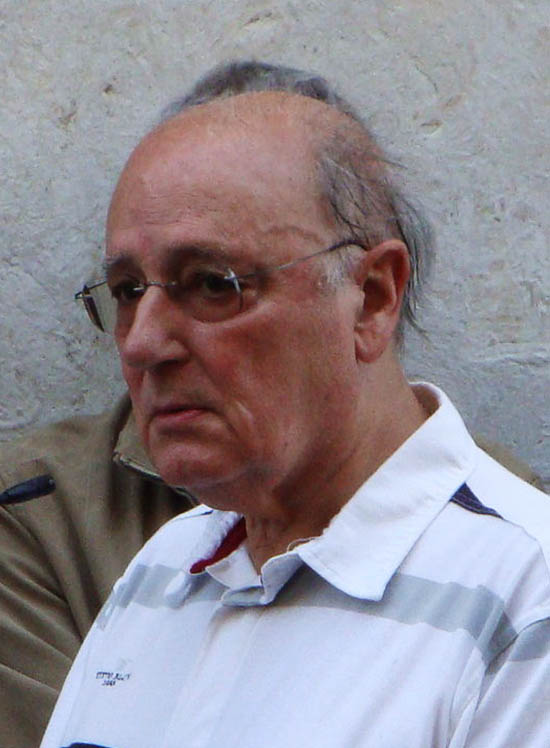 José Manuel Tengarrinha died this Friday, June 29, at 14:30 pm, in Lisbon, victim of a prolonged illness. He was 86 years old.
José Manuel Tengarrinha died this Friday, June 29, at 14:30 pm, in Lisbon, victim of a prolonged illness. He was 86 years old.
The body will be in a burning chamber at the Basilica da Estrela from 18 pm on Sunday, from where it will leave the following day to be cremated in a ceremony reserved for family and close friends.
He was born on April 12, 1932 in Portimão, into a family recognized in the region. He was the younger brother of the former communist deputy, anti-fascist resistant and artist Margarida Tengarrinha.
As António Melo writes in a note published on Facebook, José Manuel Tengarrinha's father, «with a democratic bent, was manager of the Banco de Portugal branch and took a pro-allied attitude during World War II».
This position «influenced the formation of José Tengarrinha, who at the age of 15 engaged in civic activity and joined the Movement for Democratic Unity (MUD-J), which emerged in 1945, after the war, with the aim of establishing a democratic government».
At the age of 16, he went to study in Lisbon, to avoid being detained in Portimão, but without ceasing to intervene in the MUD-J, having belonged to its central commission.
He enrolled at the Faculty of Arts in Lisbon to attend a course in Historical-Philosophical Sciences, which «had to interrupt at the beginning of the 1950s because he was conscripted for military service in the Companhia Disciplinar de Penamacor».
He enrolled as a volunteer student and completed the course in 1958, when he was already, since 1953, a journalist in the Republic.
His political commitment to the democratic opposition led to his arrest in Aljube jail, where he was at the time of the murder of painter José Dias Coelho, companion of Margarida Tengarrinha, his sister, on the night of December 19, 1961.
His political intervention on the anti-fascist front was constant, and it was natural that he would lead the Portuguese Democratic Movement (MDP) and participate in the intervention and denunciation of the electoral acts of the Estado Novo.
The April Revolution took him to parliament, where he was a constituent deputy, while resuming his teaching role at the Faculty of Arts.
This second aspect of teaching ended up standing out in his career, when, as he said in an interview, he had to choose either political activity or teaching, "since he could not be in the Assembly in the morning and in the afternoon in the Faculty" or vice versa.
His academic work took place between investigating the history of the press and the origin of popular agrarian movements in Portugal. «On both fronts, he developed pioneering work that still guides the study in the Portuguese academy in the definition of the concepts of people and public opinion», adds António Melo.
The monumental work «History of the Portuguese Periodic Press, from the Origins to 1865» and, in the second volume, from 1965 and 1989, Ed Temas e Debates, reissue 2013, «constitutes a basic reference for understanding the journalistic models in Portugal and how they constructed and they were built in a public space, within certain cultural and economic frameworks».
 His doctoral thesis, “Movimentos Popular Agrários em Portugal – 1750-1825”, published in 1994 by Europa-America, “swept away the thesis that rural insurrections had not existed in Portugal and established, through exhaustive research, how they occurred. from the Pombaline period to the liberal revolution».
His doctoral thesis, “Movimentos Popular Agrários em Portugal – 1750-1825”, published in 1994 by Europa-America, “swept away the thesis that rural insurrections had not existed in Portugal and established, through exhaustive research, how they occurred. from the Pombaline period to the liberal revolution».
The same attitude in the study of the press and its contribution to the formation of a public space, only possible after the victory of the liberal movement of 1820.
In 2006, he carried out a historical analysis of this connection between the press and public space, ranging from the liberal revolution to the Estado Novo, in «Press and Public Opinion in Portugal», Edições Minerva, Coimbra, 2006, where he distinguishes a «news block» in the first period, and an “authoritarian bloc”, in the second, which characterizes through the way global information circulates in public space.
Naturally, the people have a central role in this context, but for that it is necessary to know what this entity is. That's what Tengarrinha did in her essay “And o Povo where is it?”, published by Esfera do Caos, in 2008, where she defines how this concept of the Portuguese people, which most considered a natural revelation, was historically constructed.
Diário de Notícias recalls that “it was already 82 years old” that José Manuel Tengarrinha decided to resume an active political life that had long since fallen asleep, approaching the then newly created Free Party during the 2014 campaign for the European elections.
Rui Tavares, leader of that party, recalls, in statements to the DN, that José Tengarrinha told him that "he wanted to support the Free Party because he felt free at that time."
José Manuel Tengarrinha's legacy of citizenship went beyond political activity, having founded the International Center for the Conservation of Heritage and leading the Institute of Culture and Social Studies, based in Cascais, where he promoted “short courses” on various topics.
«José Manuel Tengarrinha was a political personality of the XNUMXth century in Portugal and a teacher for the generations of the XNUMXst century», concludes António Melo's note.


















Comments